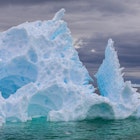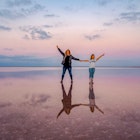
Mar 24, 2020 • 6 min read

Mar 19, 2021 • 8 min read

Marco Ferrarese (left) with his mother Tundra and his father Maurizio on a bench in Andalusia, Spain © Kit Yeng Chan
One year ago while on assignment in Peru, travel writer Marco Ferrarese received news that his parents had contracted COVID-19 at home in Italy. They were to die three days apart. Here he reflects on the past 12 months; how he has mourned his mom and dad from the other side of the world, adapted to life as a travel writer unable to travel, and found solace hiking his adoptive home in Malaysia.
One year after the first lockdowns, my biggest regret isn’t the fact I cannot travel like I used to. Until the whole travel industry grounded to a halt, I was carving a modest career by traipsing around backdoor Asia – and most recently, South America – writing and reporting for some of the world’s leading publications.
But the crown of thorns that still scratches the sides of my mind is not the abrupt interruption of my dream job. It’s not having been able to return to my native Italy to attend my parents’ funeral. And believe it or not, a year later I still have to return to see their graves for the first time.
{
"url": "covid-one-year-on-malaysia",
"destination": "Malaysia",
"continent": "Asia",
"country": "Malaysia"
}
It’s been a hard decision: travel bans and red tape still mandate that I can’t just fly back to Europe and return to Malaysia where I now belong on a whim. On top of that, after a very hard blow, leaving the relative comfort of my adoptive home, where COVID-19 hasn’t been harvesting humans as badly as in other parts of the world, seems to me as foolish as returning to the beginning of this nightmare.
One year ago, mom Tundra was 69 and dad Maurizio was 72. They died quickly – a strangely fast COVID-induced death, given their not-so-Jurassic age and pretty normal health conditions. Earlier today, as I lit up a bundle of ritual joss sticks next to the stone guardian lion of a Chinese temple, I thought of the craziness of it all.
Mom went up to heaven on March 20th after having battled the virus in an over-packed hospital ward, and dad followed her just a few days later on the 23rd. They really were made to be together until the end. From far away in Peru where I was stuck on assignment, it all felt like a horror matinee in a forgotten provincial movie theater that reeks of dust and stale popcorn. A double-feature overdose of death – the kind that gouges your eyes out of your sockets and tears your heart to shreds, like a chainsaw whirring right below your chin.

I can’t blame them or my own working circumstances. North Italy in March 2020 was probably the easiest place to get sick and die at that time: hospitals were exploding with patients and corpses, until soldiers had to carry them away in their army trucks because there was no more space to pile up the dead.
My ironic guilt was that I was far away — but so I had been for the past decade, building up a new life as a writer in Malaysia with my wife Kit Yeng.
Flights to anywhere were grounded, the military patrolled the streets, no man or vehicle was allowed to move. High up on that Peruvian plateau, the rain alternated with the blistering Andean sun as if the elements, too, had wanted to both cry and comfort my incredible loss.

Being locked down in a foreign land, far from home, when nothing you can do will change what has already happened, is something I don’t wish anybody to experience. But when you pull a knife out of your own chest, you don’t want to sit there, looking at the blood streaming in every direction until you pass out and die. You want to reach an emergency room and get stitched up as fast as you can.
Malaysia offered that opportunity, and we took it, with or without the blessing of leftover family and friends in Italy.
For the past year, I have opened my door and looked at purple shades of dawn irrigate Malaysia’s equatorial horizon. The cheeky koel, a local bird that sounds like a mix of a cuckoo and a wolf, is always there to remind me that the problems of men are no cause for concern in the natural world.
{
"url": "covid-one-year-on-malaysia",
"destination": "Malaysia",
"continent": "Asia",
"country": "Malaysia"
}Since returning to Malaysia in May 2020, I deliberately tried to distance myself as much as possible from the news, the endless social media wars between more and less entitled individuals ranting about covid hoaxes, the value of face mask, grassroots “medical” advice, and various post-apocalyptic theories.

I watched as the best part of travel “influencers”, who crumbled from their ivory towers of privileged social media illusion, ran around like headless chickens. But for me, following the koel’s call to soul-soothing natural patience still presented some huge setbacks.
“You have to come back, there are things to settle, the house, all your stuff, be responsible.” I have an older brother back in Italy, and these have been his constant mantras since we became unwilling orphans. Burdened by lockdowns, the workings of an already lethargic Italian bureaucracy turned our relationship into a sizzling plate of contrasting emotions. That faraway closure still hangs over my head like the proverbial sword of Damocles.

You can call me a selfish coward, but I won’t care: I didn’t want to keep suffering – there really was no reason to. Soon enough, deprived of our far-flung adventures, I decided, along with my wife Kit Yeng, that if we had to remain stuck on Penang island, our home, and West Malaysia, we had to take advantage of whatever we had left. Thankfully, the country remained quite open until December, when largely because of domestic tourism, the number of infections soared from a mere hundred to five thousand a day, and a second lockdown was enforced.
My second home of Penang, a UNESCO World Heritage Site, is known for its multiculturalism, one of Asia’s most celebrated cuisines, a large number of festivals, and the hip street art that helped foster one of Southeast Asia’s most vibrant art scenes.
Few know, however, that beyond its touristy facade, the cluster of peaks making up the former British colonial hill station of Penang Hill offers plenty of hiking opportunities, extending like unexplored green corridors from the center of the island to its northern and southwestern-most reaches.

“There’s so much here we haven’t explored yet,” I told my wife. She agreed that setting out to explore what we had overlooked for ten years as we focused on traveling abroad could become a very beneficial part of our new life routine – a daily ritual of making every next meal as exciting as possible, solitary writing, and spending our socially-distanced evenings at home watching good films. In the span of a few months, we walked for hundreds of kilometers, all over the island.
The lack of international (and even domestic) travel could have destroyed my career, but I didn’t allow it to be. “If one has nothing to write about at a time of global crisis, well, then that someone is not worthy of being called a writer,” a journalist friend who had also stayed on in Asia told me. His words truly rekindled my spirit.
{
"url": "covid-one-year-on-malaysia",
"destination": "Malaysia",
"continent": "Asia",
"country": "Malaysia"
}
His concept boiled down to simple Darwinism: survival of the fittest. Stop complaining, adapt to the new normal, and move forward. I just had to look around to find fast inspiration in the way that Covid had affected not just travel, but all the crevices of life. It was a perfect time to write about music and cinema, two of my other passions, as people forced at home were craving entertainment. All of a sudden, the depth of my non-Instagrammable travels turned into a thousand of great journalistic angles. So I wrote. And wrote. And I wrote even more than the previous year.
I love to think that my turn of luck was not just a result of my own determination. To tell you the truth, I never dreamed of my parents – but I have seen them on a few occasions, in the moment between the tail end of my dreams and waking up to a new day.
Mom is an acrobatic ghost: she somersaults into the room from the window right above my head, floating in mid-air as she dips her ethereal face into my forehead. If I am water, she’s the gracious deer who has come down to drink from me.

Inquisitive, she looks inside of my skull, making sure that my mind is on the right track. Like in life, Dad is more detached, but a very attentive guardian: he looks upon us both, hovering next to the window frame.
Ghosts are a big part of life in Malaysia, but as I’ve been taught, it’s best not to talk much about them, including to my wife. After all, death here is just the twilight zone of life – and for most, the end of one in a long cycle of rebirths.

I don’t know where Tundra and Maurizio are now, or what they have become, but I feel they have taken a better place and form. And I leave it to the funny-sounding koel to remind me every day of how I have been extremely lucky to end up here, after all.
You might also like:
'I can't feel my heart anymore': losing your parents in Italy while Peru's in lockdown
'Will we ever make it back?' Returning home to grieve following COVID-19 loss
{
"url": "covid-one-year-on-malaysia",
"destination": "Malaysia",
"continent": "Asia",
"country": "Malaysia"
}
Travelogue
"Sometimes the best conversations occur with strangers, without words": An act of kindness in the Scottish HighlandsApr 17, 2020 • 9 min read

Mar 24, 2020 • 6 min read

Mar 10, 2020 • 7 min read






Jul 31, 2024 • 4 min read
